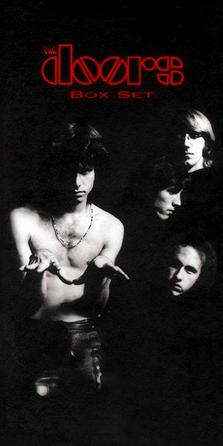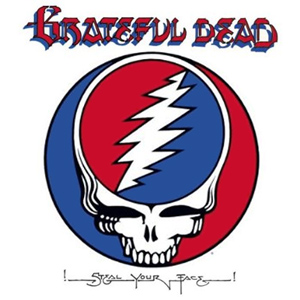Seeing as most bands were commemorated with box sets by the end of the century, it made sense that the Doors would get their own as well. With six studio albums to cherry-pick, they did their fans a solid by concentrating on rare material for three of the four discs in the imaginatively titled
Box Set.
The first and third discs focus on a sprawling pile of live recordings and studio outtakes, sequenced without regard to chronology or source. Seeing as the thrust of the set was to highlight Jim Morrison’s “genius” and “fearlessness”, such a random approach makes sense. The set begins, appropriately, with “Five To One” from the infamous Miami concert that got Jim arrested for, among other things, calling the audience a bunch of “f—king idiots”. This is followed by a “jazz” version of “Queen Of The Highway” for an exercise in extremes, and from there it’s a chaotic bounce back and forth through a six-year stretch. Their earliest demos, before Robbie Krieger joined, are scattered throughout, are notable for Ray Manzarek playing piano a la Ramsey Lewis on songs that would eventually become band staples. (“Go Insane” is the exception, and would have been in popular rotation on the Dr. Demento show.)
The real draw on these discs would be the variety of unreleased songs and sketches, from both stage and studio, most frankly better off unreleased in the first place. For example, “Rock Is Dead” is a 16-minute edit of an hour-long jam the boys put on tape after getting smashed at a Mexican restaurant near the studio. “I Will Never Be Untrue” is something of an Otis Redding homage, Robbie doing his best Steve Cropper imitation. “Black Train Song” finds them wandering through “People Get Ready”, “Mystery Train”, and “Crossroads” via a tune called “Away In India” while teenyboppers scream for “Hello I Love You”. Most surprising to these ears is their arrangement of “Albinoni’s Adagio In G Minor”, supposedly with actual strings overdubbed on the spot.
Just to keep it confusing, the third disc begins with “Hello To The Cities”, which combines an Ed Sullivan introduction with Jim purposely greeting an audience with shout-outs to other cites than the one they’re in. “Break On Through” from the Isle of Wight in 1970—one of their last performances—is marred by Ray’s doubling of Jim’s vocal, then we go to Vancouver for sloppy versions of “Rock Me” and “Money” with Albert King sitting in. “Someday Soon” was designed to deflate blissful hippies with a reminder of their mortality, just as “Mental Floss” and the brief “Adolph Hitler” joke (“still alive… I slept with her last night”) are supposed to be provocative. “Orange County Suite” is nice, even though it combines a tape of Jim singing his poetry with modern backing from the other three. This follows “Tightrope Ride”, the only selection from the Jim-less portion of the catalog.
In between, a disc of recordings from the band’s stand at the Felt Forum in early 1970 presents something of a companion to the Absolutely Live album. A few songs from the then-new Morrison Hotel give way to a full performance of “Celebration Of The Lizard”, then a blues detour takes us through “Crawling King Snake” a year before its appearance on an album, ill-advised takes on “Money” and “Gloria”, plus a rambling extemporization credited as “Poontang Blues/Build Me A Woman/Sunday Trucker”. An 18-minute extension on “The End” closes the disc. Even when Jim’s pitch wavers, and it does, the band is tight throughout.
The fourth disc, of “band favorites”, offers five tracks chosen by each of the three surviving members. Obvious tracks like “Light My Fire” and “Riders On The Storm” sit alongside such deep cuts as “Shaman’s Blues” and “Yes, The River Knows”. It’s fairly evenly split between the six albums, though Strange Days is represented the most.
Box Set wouldn’t be the only doorstop unleashed to commemorate the band, of course. Two years later, The Complete Studio Recordings presented the first six albums, supported by none of the B-sides or post-Jim releases, but did include a disc called Essential Rarities culled from the Box Set. (This was released as a standalone disc a year after that, touting the rare track “Woman Is A Devil”, which was merely an excerpt from “Rock Is Dead”.) 2006’s Perception served up remastered versions as well as surround mixes of each of the same albums with their 40th anniversary bonus tracks; five years later, A Collection consisted of just those albums in replica sleeves, with no bonus tracks. And in 2025, the standard six were repackaged again, this time in Atmos and hi-res mixes on six Blu-ray discs as Immersed. (Of more interest to connoisseurs would be the ongoing Bright Midnight series of official bootlegs, which we’re not even to attempt to catalog.)
The Doors Box Set (1997)—3







:format(jpeg):mode_rgb():quality(90)/discogs-images/R-4928745-1379708694-6493.jpeg.jpg)